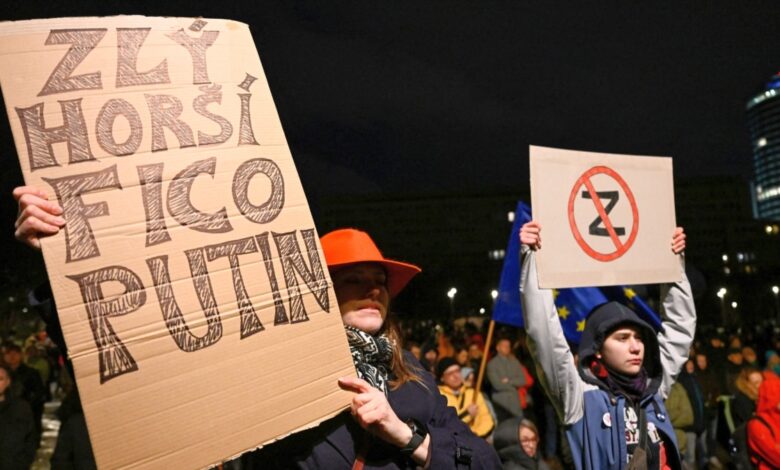Putin Meets Slovak PM In Moscow For Expected Talks About Natural Gas Deliveries

Russian President Vladimir Putin said Moscow is nearing its primary goal in the war against Ukraine and challenged the United States to a missile “duel” involving Russia’s new Oreshnik hypersonic ballistic missile.
Speaking at an annual news conference used in large part to show his control over almost every aspect of Russia’s political and economic spheres, Putin boasted about the country’s economy, glossing over the impact of severe sanctions imposed by the West for the Kremlin’s full-scale invasion of Ukraine.
The tightly controlled question-and-answer session on December 19, a live broadcast on state TV that lasted almost 4 1/2 hours, focused on domestic issues at the start before turning to foreign policy, namely the war in Ukraine.
Putin, in power for almost a quarter of a century, said Russian forces were advancing along the front line of Ukraine and were moving toward achieving their primary goals.
He didn’t specify what he meant, but previously he has said peace will be possible after the “denazification, demilitarization, and a neutral status” of Ukraine.
Russia has falsely claimed Ukraine is run by “radical nationalist” and neo-Nazi groups.
Later in the broadcast, Putin said he was ready for “negotiations and compromises” in possible peace talks with U.S. President-elect Donald Trump and that he had no conditions for starting such talks.
Putin has previously ruled out making any major territorial concessions to end the war, while it has also insisted Kyiv abandon its ambitions to join the NATO military alliance.
“Soon, those Ukrainians who want to fight will run out, in my opinion. Soon there will be no one left who wants to fight,” he said.
“We are ready, but the other side needs to be ready for both negotiations and compromises.”
However, Putin also admitted he could not say when Russia would regain full control of the western region of Kursk, where Ukraine launched a shock offensive in August and still occupies territory.
“We will absolutely kick them out. Absolutely. It can’t be any other way. But the question of a specific date, I’m sorry, I cannot say right now,” Putin said.
The Russian Foreign Ministry said on December 19 that Foreign Minister Sergei Lavrov had spoken by phone the day before with his Swiss counterpart, Ignazio Cassis, about the conflict in Ukraine. The ministry said Lavrov “explained in detail the Russian position on the settlement of the situation” and outlined Putin’s conditions.
Well-known military analyst Michael Kofman at the Carnegie Endowment for International Peace said on a podcast earlier this month that he was skeptical that Russia would agree to an early cease-fire and suspected that Moscow could try to tie up the United States in “envoy diplomacy” for months.
“I’m sure they’ll be happy to schedule a summit in Geneva or perhaps some other place in Europe, all the while intending to make gains on the battlefield. And they’ve done this before,” said Kofman.
Kofman added that if Ukraine can maintain its front lines and prevent a breakthrough over the next several months, Russia’s negotiating hand will weaken as military resources and economic problems become more acute.
Russia has been trending toward authoritarianism since the beginning of Putin’s tenure.
But since an election in 2018, that trend has been more firmly entrenched than ever. The already marginalized opposition has been crushed.
Earlier this year, Aleksei Navalny, Putin’s most prominent critic, died while in a Siberian prison.
A raft of constitutional amendments imposed in 2020 enabled Putin to seek two additional six-year terms, the first of which he secured with a landslide victory in March in balloting the international community called a “sham” and not “free and fair.”
The 72-year-old Putin, who is set to surpass Soviet dictator Josef Stalin’s nearly 30-year reign by the end of his new term to become the longest-serving Russian leader in more than two centuries, could conceivably hold power until 2036.
Putin struck a defiant tone when the subject of weaponry came up during the broadcast. In an apparent trolling of Washington, he suggested a “21th-century high-tech duel.”
“Let them determine some target for destruction, say in Kyiv: Concentrate all their air defense and missile defense forces there, and we will strike there with Oreshniks and see what happens,” he said.
“We are ready for such an experiment, but is the other side ready?”
Russia launched the so-called Oreshnik ballistic missile against Ukraine on November 21 in a strike targeting the city of Dnipro.
Putin said at the time it was part of Moscow’s response to Ukrainian attacks on Russian soil with U.S.-supplied ATACMS and British-supplied Storm Shadow missiles.
Analysts have voiced skepticism about the Oreshnik, saying the launching of the new intermediate-range missile was as much about political messaging as it was about military might.
Putin has been raising the specter of a nuclear strike since long before the full-scale invasion of Ukraine in February 2022 and analysts said the Russian leader chose the Oreshnik to send a different signal to Washington.
“It’s the kind of signaling you engage in when you can’t, in fact, escalate in the way you’ve been threatening,” Ruth Deyermond, senior lecturer in the Department of War Studies at King’s College London, wrote on X of the November 21 missile strike.




